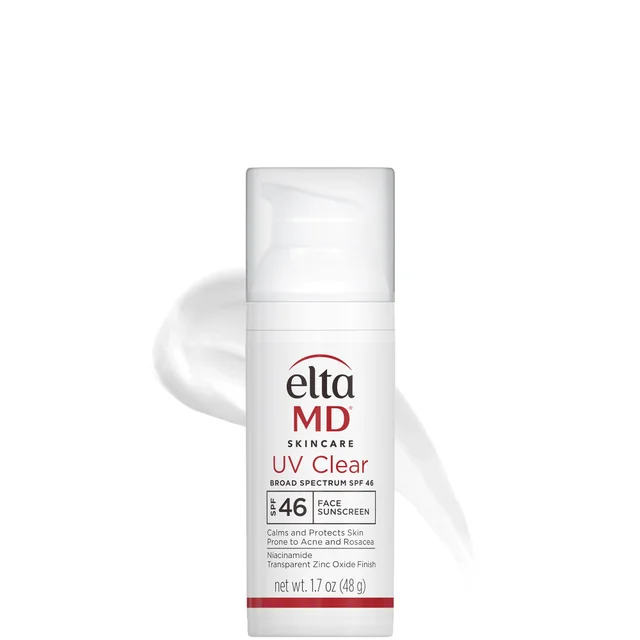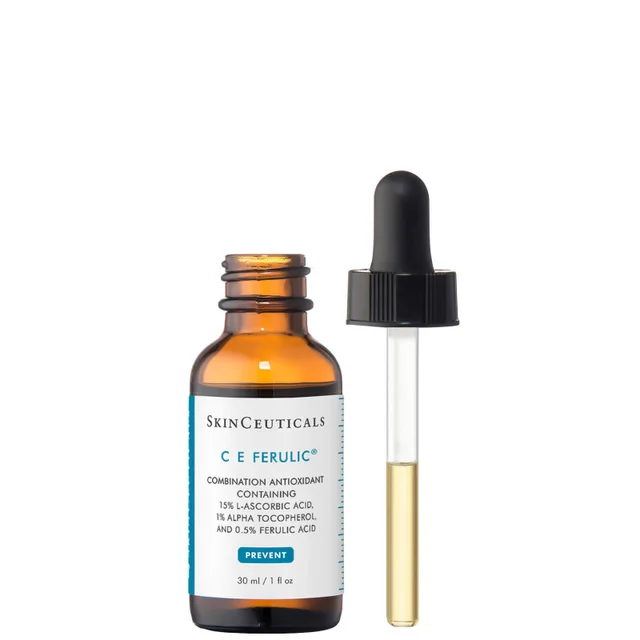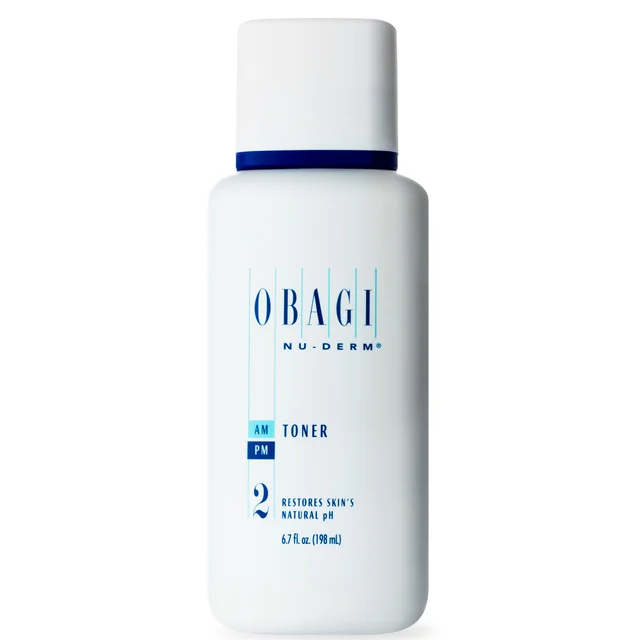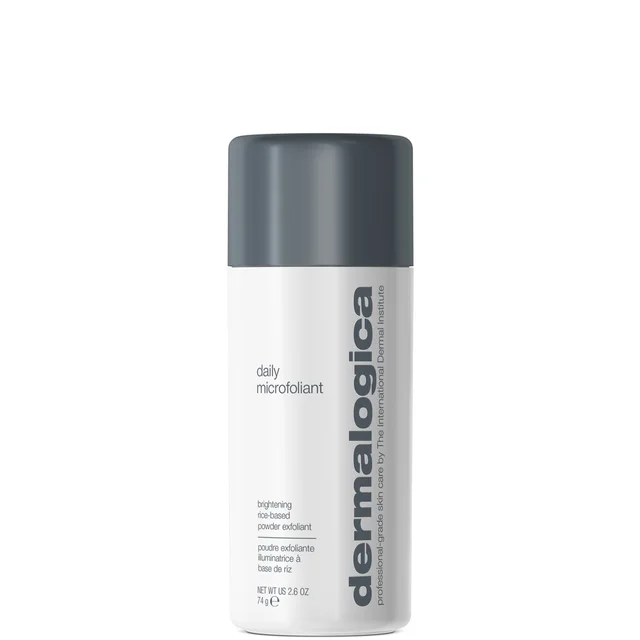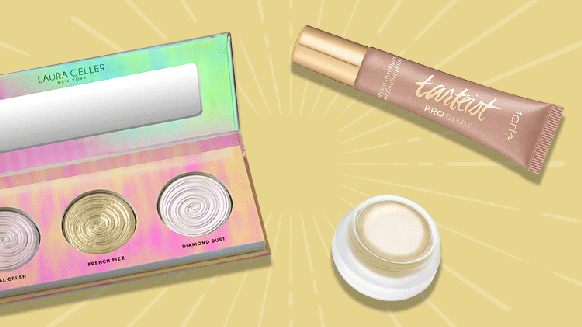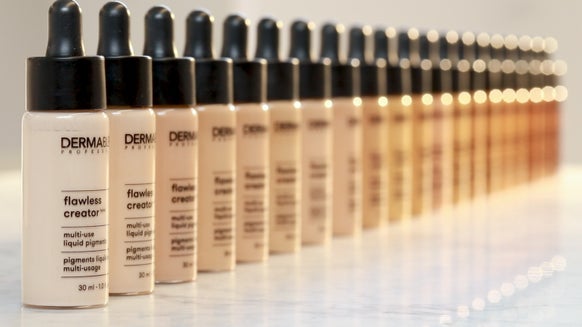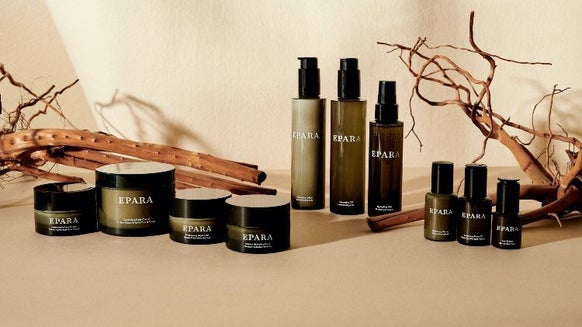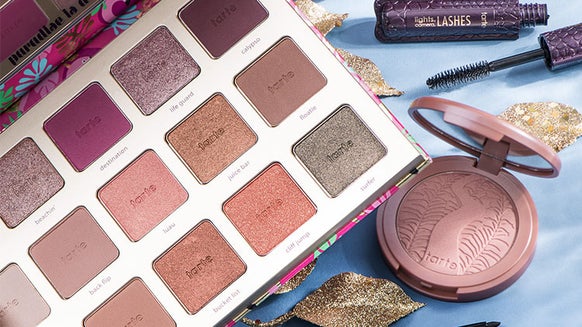Dermstore’s Guide to Beauty Ingredients
Ingredients A–D
Ingredients E–K
Ingredients L–P
Ingredients R–Z
Stem CellsTartaric AcidTea Tree OilTitanium DioxideVitamin AVitamin C
Acai
Short Definition Acai is a deep purple, antioxidant-filled berry from Acai Palm Tree.
Packed with more antioxidants than cranberries, raspberries, blackberries, strawberries or blueberries, acai is a potent source of the antioxidants ferulic acid, epicatechin and vitamins A, B, C and E, which is why it's used often in anti-aging skin care products. It also contains omega-3 and omega-6 fatty acids, which are important building blocks for the skin and hair.
Adenosine
Adenosine is derived from yeast and helps to smooth the skin.
Naturally present in living things, adenosine is an important source of energy required for normal function and growth of cells. When used regularly in skin care products, adenosine has been shown to help support skin cells and increase production of collagen, improving texture and firmness of the skin as well as reducing fine lines.
Agar
A thickening and binding substance derived from seaweed or algae.
A vegan alternative to gelatin, agar is a hydrophilic polysaccharide (water-loving sugar) from marine plants, most commonly red algae. It has a smooth texture and is water-soluble, used most commonly in lotions, creams and balms to bind ingredients together and help create a stable, uniform consistency. It also gives skin care and cosmetics a smoother, creamier feel, which adds to a product’s appeal. Agar may help skin retain moisture because of its water-binding properties.
Allantoin
A component of many plants including comfrey that may help slow down aging.
Allantoin is a compound found naturally in most animals and plant. It has properties that have been shown to help strengthen the skin and regenerate new cells to help with healing and smoothing scars, which is why you'll find this ingredient most commonly in anti-aging creams, scar creams and moisturizers. Allantoin also helps to calm sensitive skin that can be irritated easily from other products.
Aloe Vera
A polysaccharide-rich gel that comes from the leaf of the aloe plant used in skin care to moisturize and soothe skin.
Because of its moisturizing and anti-inflammatory properties, aloe is commonly used in lotions, as well as products designed to soothe skin concerns such as psoriasis and sunburns, in addition to other minor burns and cuts. Aloe also contains antioxidants and other nutrients, such as proteolytic enzymes, which help encourage collagen and elastin growth. This may help reduce the appearance of fine lines, wrinkles, scars and stretch marks.
Alpha Hydroxy Acids
A group of natural acids found in plants used in skin care to exfoliate skin.
A type of chemical exfoliant, alpha hydroxy acids (AHA) are water-soluble, plant-derived acids that help loosen the glue that holds dead skin cells together on the surface of skin so they can easily be sloughed off. Aside from exfoliating dead layers, AHAs can also accelerate cell turnover and absorption of skin care products, which helps diminish fine lines and wrinkles, improve skin tone and texture, unclog pores and fade dark spots. Common AHAs include glycolic acid and lactic acid, which are generally considered safe to use during pregnancy.
Amino Acids
The building blocks of protein that play many critical roles in your body.
Amino acids, often referred to as the building blocks of proteins, are compounds that help the body perform various processes such as building muscle and regulating immune function. Some amino acids are produced naturally in the body, but the rest are obtained by getting protein from your diet. They are also naturally present in the skin as part of our natural moisturizing factor, playing an important role in protecting and hydrating the skin.
Because amino acids are important building blocks for peptides that can stimulate cell activity like collagen synthesis, amino acids are commonly used in anti-aging products. Some amino acids like glutathione have antioxidant properties, which help fight off UV damage. Amino acids also help strengthen hair and nails, and may help stimulate growth.
Antioxidants
Substances such as vitamins, minerals and enzymes that help prevent damage from free radicals created by the sun and pollution.
Antioxidants work by reversing and preventing free radical damage or oxidative stress, which are formed from environmental damage caused by the sun, pollution, toxins, tobacco and stress, to name a few sources. Because antioxidants inhibit free radicals that break down collagen, cause dark spots and accelerate skin aging, they are used topically, usually as a cream or serum, to help keep the skin looking youthful.
Apple Cider Vinegar
A multi-purpose vinegar made from apple juice.
Apple cider vinegar is made from squeezing the juice of apples and adding yeast and bacteria that cause the juice to ferment to vinegar. The bacteria and yeast produce important vitamins and minerals such as vitamins A, B1, B2, B6, C and E as well as calcium, copper, iron, magnesium, potassium and sodium. Plus the good bacteria and yeast found in the fermentation process have anti-inflammatory and antibacterial benefits as well. Apple cider also has AHA that gently exfoliates the skin helping with acne and irritation. It can also be used as a natural cleanser to reduce buildup of hair products.
Arbutin
A natural skin brightening compound made from extracts of the bearberry, licorice, cranberry or blueberry plants.
Arbutin is a compound made from the extracts of the bearberry, licorice, cranberry or blueberry plants. Often used as a safer alternative to hydroquinone, it works to fade dark spots and brighten the skin by diminishing the production of melanin, the pigment in your skin. Arbutin also has antioxidant properties that can protect the skin from free radical damage.
Argan Oil
A natural oil that is rich in fatty acids known for providing external and internal health benefits.
Argan oil has become one of the biggest oils in the beauty industry. Made from the fruit of Argan trees native to Morocco, this oil is high in oleic and linoleic acid and rich in vitamin E, making it an excellent moisturizer and antioxidant with anti-inflammatory properties. A common ingredient in anti-aging creams and moisturizers, argan oil is also popular among hair products for its ability to provide ample moisture, repair damage and restore shine.
Avocado Oil
An oil extracted from avocado that is rich in essential fatty acids important for healthy skin.
Avocado oil is extracted from the fruit of the avocado tree. It is one of the only oils that is made by extracting the meat, rather than the seed of the fruit. Typically used in cooking, this oil is rich in healthy, fatty acid to help reduce dryness of the skin and hair. Because it contains vitamin A, B and E and vitamin E, it has antioxidant properties as well.
Azelaic Acid
A gentle acid derived from whole grains.
Azelaic acid is a gentle acid derived from wheat, rye and barley. Typically used in face creams, gels and foaming cleansers, azelaic acid has antibiotic, anti-inflammatory and exfoliative properties, making it a well-tolerated choice to help with acne and pigmentation.
Bamboo Leaf Extract
A compound found in bamboo leaves that is commonly used in hair care treatments.
Bamboo leaf extract contains over 70% silica, the silicon- and oxygen-rich compound that is responsible for restoring and strengthening the connective tissues in the body. Although silica is found in many properties, bamboo is one of the only plants that can be grown without pesticides or chemicals, making it an excellent renewable resource for silica.
Beeswax
Short Definition:
Wax that bees produce, commonly used in skin, makeup and hair products as a thickener and conditioning agent.
Beeswax is the wax made by honey bees. This natural wax is high in fatty acids and is used in many hair, skin and nail products because it does not separate from liquids like most other oil-based waxes. This wax can be manipulated into many different forms, making it one of the most used, commercial waxes in beauty.
Beeswax is used in many products for a wide range of beauty uses. It is used in lipsticks and balms to give a smooth application and hold its structure. Beeswax is used in some eye makeup to stiffen the product and to provide long-lasting wear.
Bentonite Clay
A type of natural clay made from volcanic ash.
Bentonite clay is a natural clay made from volcanic ash that contains a multitude of minerals, including iron, calcium, magnesium, potassium, silica, sodium and more. Because of its absorbent qualities, bentonite clay is often used in masks and other skin care products designed to reduce excess oil, reduce the appearance of pores and exfoliate dead skin cells.
Benzoyl Peroxide
Benzoyl Peroxide is a common over-the-counter white powder that is commonly used to treat acne.
Benzoyl Peroxide is a white powder that acts as a drying and antibiotic ingredient. When applied to the skin, it removes the excess moisture, oils and other compounds that cause bacteria buildup. Benzoyl peroxide is also commonly used as a chemical indicator in the application of acrylic nails, turning liquid into a solid.
One of the most common uses Benzoyl peroxide is to treat acne. Why? Acne starts very deep down in the pore, making it hard to treat. Benzoyl peroxide penetrates deep into the pore, flooding it with oxygen that kills acne-specific bacteria. But be careful, benzoyl peroxide will bleach clothes and towels.
Beta Hydroxy Acids
A category of gentle acids that has exfoliating properties.
In skin care, beta hydroxy acids (a.k.a. BHAs) are known for their ability to penetrate deep into the pores, ridding them of dirt, oil and bacteria, making them ideal for products designed to address oily or acne-prone skin (which are prone to congestion). Beta hydroxy acids are also anti-inflammatory, antibacterial and antifungal, which help calm the redness and irritation that often accompany breakouts. You may know one of these better as the acne-fighting ingredient salicylic acid.
Biotin
A water-soluble vitamin produced by the body and found in certain foods.
Also known as vitamin B7 and vitamin H, biotin helps the body break down and process fats and proteins. Because biotin has been shown to help to restore moisture and strengthen brittle hair and nails, it's most commonly found in oral supplements for hair and nails.
Bromelain
A mixture of enzymes derived from pineapples.
Bromelain is a nutrient-rich extract that has anti-inflammatory properties, which makes it a common ingredient in ointments designed to accelerate healing of bruises , wounds and swelling. Bromelain also works as an exfoliator, removing dead skin cells to soften skin and give it a clearer complexion. It is also good source of vitamins A and B, which are important for nail health.
Caffeine
A stimulant found in coffee, tea, soda and other products.
A well-known stimulant, caffeine first appeared in skin care products as a way to reduce cellulite. Though that's since been debunked, its ability to de-puff and soothe inflammation has made it a mainstay in eye creams and treatments. According to some studies, caffeine may narrow the blood vessels and calm skin, which can help reduce redness and puffiness (but only temporarily). A powerful antioxidant, caffeine can help prevent and repair skin damaged by UV light.
Calendula
An extract derived from a plant called calendula officinalis or common marigold.
A popular skin care ingredient for centuries, calendula extract has been prized for its soothing abilities, anti-inflammatory, anti-bacterial and antioxidant properties, which can promote wound healing, calm irritation and even soothe sunburn and eczema. Calendula may also help hydrate and soothe dry, damaged and sensitive skin. Although generally recommended for sensitive and baby skin, because it is part of the compositae family, there is risk of allergic reaction.
Camphor
An itch-relieving compound derived from the leaves and bark of the camphor tree.
Camphor is known for both its topical as well as aromatic benefits. (It's a standby in chest rub formulas.) Camphor It is often paired with menthol to calm itchiness caused by anything from irritation to dryness to poison ivy. It may also reduce swelling and pain associated with muscle soreness.
Do not use undiluted camphor products or products containing more than 11% camphor as these can be irritating to the skin. Ingesting or applying camphor to broken skin are also unsafe in high concentrations. Camphor may also cause skin and eye sensitivity on contact.
Camu Camu
An antioxidant-rich purple berry found in Brazil.
A cousin of the guava, camu camu is widely considered a superfruit in its native Brazil as it contains more vitamin C that any other plant. Vitamin C helps protect the skin from free radicals that damage collagen, as well as brighten skin and even out skin tone. Camu camu is also rich in flavonoids, a compound that serves as both an antioxidant and an anti-inflammatory agent.
Carnauba Wax
A hard, vegan wax derived from a tropical palm tree.
Also known as Brazil wax, carnauba is the toughest of all vegetable waxes used in beauty products. It can thicken formulas, give them a solid form (think lipstick), and keep emulsions of oil and water from separating together so they can retain a smooth, uniform texture. Carnauba is often paired with beeswax to give products a shiny, glossy finish, which is essential for formulas such as lip balm and hair pomade to restore moisture and boost shine. Because carnauba is soft and pliable when heated and hard at room temperature, it's a popular ingredient for waxing kits.
Carrageenan
A thickening ingredient derived from red seaweed.
Carrageenan is a seaweed gum added to thicken products and help hold ingredients together. When added to products, it helps products retain its moisturizing properties by holding water onto the skin and hair, which is why it is often used in moisturizers, shampoos and conditioners.
Castor Oil
A botanical oil extracted from the seeds of ricinus communis.
One of the most popular oils used in skin care formulas, castor oil is an emollient, meaning it traps moisture into skin and hair to minimize dryness and boost hydration within it. It is also rich in fatty acids and antioxidant, and may help improve the absorption of other active ingredients into skin's layers, where they can work better and more efficiently. Castor oil has been shown to help with redness and irritation of the skin.
Caviar Extract
Short Definition:
An extract derived from roe, or eggs of sturgeon and other fish.
Caviar extract is harvested from fish roe and packs some of its source's nutrients, like essential fatty acids and protective antioxidants. Caviar extract's antioxidant properties help defend skin from free radicals, or molecules that can damage cells and destroy collagen. Fatty acids omega-3 and omega-6, on the other hand, hydrate skin and help maintain its moisture barrier. Datty acids benefit hair, too, by moisturizing strands and restoring shine.
Ceramides
Long chains of lipids naturally found in skin's outermost layers.
Ceramides are lipids, or fats, that make up over half of skin's outer layer. They're essential for retaining water and maintaining a healthy skin barrier. The natural store of ceramides in skin diminishes with age and sun damage over time.
In skin care products, they're often derived from plants like wheat germ. Known for their water retention abilities, ceramides can both restore moisture levels in skin and defend it against dehydration.
They can also strengthen skin's moisture barrier, which seals in moisture, minimizes sensitivity and keeps out external aggressors.
Chamomile
An anti-inflammatory and skin-soothing herb.
Chamomile is considered a medicinal herb that is part of the asteraceae species (sunflower and daisy family). It is rich in flavonoids, alpha-bisabolol, blue chamazulene, farnesene and polyenes, giving it anti-inflammatory, anti-erythema and anti-pruritic properties, which can calm and accelerate healing of damaged skin cells. The extracted oil of the chamomile plant is bisabolol, which is high in panthenol that stimulates cell turnover. Chamomile works to sooth the skin, helping to treat eczema and other dry skin conditions.
Charcoal
A highly absorbent natural agent made from burned carbon.
Charcoal, a natural agent made from burned carbon, is prized in skin care for its ability purify and detoxify the skin, acting as a sponge to soak up surface oil, deep-seated debris and environmental pollutants. This action is said to balance oil production, exfoliate dead cells and create a brighter and smoother complexion with smaller-looking pores.
Charcoal becomes “activated charcoal” when high temperatures combine with a gas or activating agent to expand its surface area, making it more porous than regular charcoal.
Citric Acid
A mild AHA acid found in citrus fruits.
Citric acid is an alpha hydroxy acid naturally found in citrus fruits such as lemons and limes. In skin care, citric acid is often used in products designed to exfoliate dead skin cells and support cell turnover, helping improve the appearance of photoaged skin and restore skin elasticity. It is also used in skin products to adjust their pH.
Coconut Oil
Oil extracted from the coconut fruit.
Coconut oil is rich in triglycerides, lauric acid, vitamin E and proteins. It is the most abundant source of lauric acid, a fatty acid known for its antimicrobial, moisturizing and hormone-balancing characteristics. This helps strengthen the skin's protective barrier and improve moisture retention, healing dry, irritated skin conditions including eczema. Aside from fatty acids, coconut oil is also packed with antioxidants to help prevent signs of aging and repair damaged skin and hair by increasing surface level lipids.
Because of its high content of saturated fat, pure, unprocessed coconut oil may block pores, which is why some dermatologists recommend it to be used as a moisturizer just for the body, but not for the face.
Coenzyme Q10
A coenzyme found in most living things used by cells to process energy.
Found within cells of most living things, coenzyme Q10, or CoQ10, perform a variety of functions. It provides the skin with high concentrations of antioxidants, neutralizing free radicals and reducing the amount of oxidative stress found in the skin. It also produces ATP, which is energy used by cells.
Collagen
A protein peptide that makes up 30 percent of our body's total protein mass.
The most abundant protein in the human body, collagen peptides are found in the skin, tendons, cartilage, ligaments, linings of the bones and blood vessels and help the body maintain its shape. It is a fibrous substance that supports and connects tissues and internal organs while retaining the skin's elasticity and hydration. In skin care, it is used to increase hydration by improving the skin's barrier function and retaining water.
Colloidal Oatmeal
Finely ground oatmeal that provides antioxidant protection and moisturizing and soothing properties.
Colloidal oatmeal is the most common form of oatmeal used in skin care. As an anti-inflammatory, it helps provide relief to many skin conditions such as rashes, redness, burns, itch, eczema and psoriasis. It also encourages moisture retention by reinforcing the skin's barrier function. Its high concentrations of phenols offer superior antioxidant protection.
Copper Peptides
A naturally occurring compound found in human tissues.
Copper peptides are the element copper combined with three amino acids. Naturally found in human tissues, copper peptides begin to deplete over time, contributing to the aging process. Studies show that when used in skin care, copper peptides help remove the damaged collagen and elastin from the skin. In addition, copper induces a skin-tightening effect that helps improve skin firmness and elasticity. Copper peptides also provide antioxidant protection, neutralizing free-radicals and reducing visible signs of photodamage.
Cucumber Extract
Juice derived from cucumber, which is mostly water but contains many skin helpful ingredients including vitamin C, silica and caffeic acid.
Rich in skin-enhancing nutrients like vitamin C, caffeic acid (another antioxidant), fatty acids, silica and other minerals, cucumber extract is a popular ingredient among soothing and hydrating skin care products. Aside from antioxidants, it also contains high concentrations of lactic acid, which helps rid skin of dead surface layers.
Dimethicone
A man-made silicon-based polymer used in skin care to lubricate and condition.
Also known as polymethylsiloxane, dimethicone is an ingredient used in many skin care products as a stabilizer, designed to form a silky, smooth texture for easy spreadability. It is also used as an anti-foaming agent. An oil-free moisturizer alternative and a common ingredient in hair conditioners, dimethicone helps provide a protective barrier to help the skin and hair retain moisture.
Dioic Acid
An organic compound used in products designed for hyperpigmentation and acne-prone skin.
Dioic acid can be found naturally in vegetable fats and oils, used in products designed for hyperpigmentation, aging and acne-prone skin. It works to reduce the production of sebum and fight acne-causing bacteria while also enhancing uneven skin tone.
DMAE (Dimethylaminoethanol)
A compound that helps support brain activity and skin tenacity.
DMAE can be found naturally in the brain but is most commonly sourced from sardines and anchovies. It is largely repurposed as tablets or capsules and works to send signals to specific neurotransmitters in the brain, improving memory and many cognitive brain functions related to our ability to focus, achieve mental clarity and accomplish difficult tasks.
In skin care, DMAE is often used in products designed to improve skin elasticity and decrease inflammation. However, studies are limited and often convey conflicting results.
Essential Oils
Essential oils are the highly concentrated oils extracted from plants.
An essential oil is a concentrated aromatic liquid extracted from plants, particularly in the seeds, bark, stems, roots or flower. Essential oils are primarily used for fragrances and flavorings, but because many of these oils have antiseptic, germicidal and preservative properties, they are also used in skin care, body care and household products. Also used in aromatherapy to address a variety of health issues, including anxiety, insomnia and inflammation, among others. As they are a very concentrated liquid, they can be irritating or cause an allergic reaction in sensitive skin.
Epidermal Growth Factor
Epidermal growth factor (EGF) is a polypeptide (molecular chain of amino acids) that activated biologic activities in the skin including wound healing through stimulating dermal and epidermal regeneration.
EGFs and their receptors are found in fibroblast cells that make up the dermal layer of our skin. They are important signaling factors that can increase collagen production and regenerate damaged skin by stimulating healthy cells to initiate the healing process. When applied to skin, they’ve been shown to stimulate skin growth at the cellular level and are believed to have positive effects on the early signs of aging.
Evening Primrose Oil
Evening primrose oil is obtained from the seeds of the flowers of the evening primrose plant, traditionally used to treat minor wounds, bruises and hemorrhoids.
Evening primrose oil contains an omega-6 fatty acid called gamma-linolenic acid (GLA) that may be responsible for the oil’s healing benefits. It has been traditionally used to treat bruises, hemorrhoids, digestive problems and sore throats. More recently it has been used to help with inflammatory skin conditions such as eczema, rheumatoid arthritis, breast pain, menopause symptoms and many others but studies are lacking to support these claims.
Ferulic Acid
An organic compound, and a powerful antioxidant, found in the cell walls of plants.
Found in plants such as rice, oats and the seeds of apples and oranges, ferulic acid is an antioxidant with excellent skin penetration, that helps slow the aging process by simultaneously protecting skin from free radicals and correct existing damage. Ferulic acid is said to be one of the most potent antioxidants available, and enhances the stability of other antioxidants, vitamins C and E.
Glycerin
A humectant present in fats, animal, vegetable or synthetic.
Glycerin, also known as glycerine or glycerol, is naturally present in skin. As a powerful humectant, it attracts water to the skin, helping maintain its moisture level. Studies show glycerin combined with emollients (moisturizers) promotes healing, reduces irritation and restores normal skin barrier function.
It is used in several skin care products, particularly moisturizers as well as a bonding agent for many types of makeup.
Glyceryl Stearate
Derived from palm kernel, vegetable or soy oil, glyceryl stearate acts as a lubricant on the skin's surface.
Glyceryl stearate is formed after glycerin reacts with stearic acid, a fatty acid found in plant oils as well as our body. The two combine to make a cream-colored and waxy type substance that works as a barrier to protect skin and hair. It also is a surfactant and emulsifying agent to help ingredients blend together and have a cosmetically elegant feel.
Glyceryl stearate is generally considered a safe ingredient and can be found in a multitude of cosmetic products ranging from makeup, hair products and moisturizers.
Glycolic Acid
A natural derivative of sugar cane used in various skin care products.
A derivative of sugarcane, glycolic acid is an alpha hydroxy acid (AHA), a group of naturally occurring acids that can be found in foods. AHAs work by loosening the glue-like substance that holds dull and dead skin cells on the topmost layer of your skin, revealing newer, healthier skin. And because glycolic acid has the smallest molecular size of all the AHAs, it’s the most bioavailable and active, allowing it to penetrate the skin the most easily. It is also a humectant, able to pull water into the skin.
Glycolic acid peels, the ones administered in your dermatologist’s office, contain a high concentration (up to 30 percent) and can address various skin concerns from acne scars to sun spots. Serums and moisturizers containing glycolic acid use between 5 to 10 percent concentration.
Grape Seed Extract
Derived from the ground-up seeds of red wine grapes and is a potent source of antioxidants.
Grape seed extract contains a high level of the antioxidant proanthocyandin, and is commonly used as a dietary supplement. It is said to have numerous health benefits that range from lowering high blood pressure to wound healing. One researched benefit of grape seed extract is its potential to prevent skin cancer in mice although these benefits have not been seen in human studies.
Green Tea
A powerful antioxidant made from camellia sinensis leaves.
Green tea is rich in antioxidants, specifically catechin and polyphenol, which help neutralize free radicals that accelerate the skin's aging process. It also has excellent antibacterial and anti-inflammatory benefits, which help reduce inflammation associated with acne, rosacea, psoriasis and many other skin concerns and is well tolerated by sensitive skin. Aside from anti-aging skin care products, it is also commonly found in many eye cream treatments because of its vitamin K, which helps brighten dark circles.
Hemp Seed Oil
Hemp seed oil is an oil derived from the hemp plant, cannabis sativa.
Hemp seed oil is a fatty acid-rich oil found often in natural skin and beauty products. Its fatty acids closely mimic our skin's natural oils, which makes it well tolerated and particularly effective as an emollient in moisturizers and hair conditioners.
Honey
A golden liquid produced by bees from the nectar of flowering plants.
Honey gets it sweetness from fructose and glucose and has natural antimicrobial and antioxidant components, making it a highly effective ingredient in skin care products that aim to calm and heal the skin. Honey also has hydrating qualities, which can help smooth and strengthen skin, hair and nails.
Hyaluronic Acid
A naturally occurring sugar found in the body, which aids in moisture retention and skin hydration.
Hyaluronic acid is a hydrophilic (water-loving) compound that has the ability to draw moisture right out of the air and hold up to 1,000 times its weight in water in the skin.
It is naturally present in all our connective tissues and skin, but because our body’s production of this slows as we age, this ingredient is widely used in skin care products designed to battle dryness and improve skin texture and elasticity. Hyaluronic acid is also used as a natural alternative to synthetic fillers injections.
Hydrocortisone
A form of cortisol, used in topical medications that relieve itch, redness, swelling and discomfort.
Hydrocortisone is an anti-inflammatory and immunosuppressive drug, used in medications designed to soothe redness and reduce swelling from insect bites, allergies, eczema, psoriasis and other inflammatory skin conditions. Considered a mild corticosteroid (a class of drugs called steroids), it prevents the release of substances in the body that cause inflammation and is considered safe for short term use on the skin. Long term use (daily for months) can lead to thinning of the skin.
Hydrogen Peroxide
A chemical compound used as a bleaching agent and antiseptic.
Hydrogen peroxide is a chemical compound that acts as a mild disinfectant used to clean cuts, burns and stitches. It may also lighten dark spots on the skin. Hydrogen peroxide is also used to bleach hair by breaking down its color-causing molecules.
Hydrolyzed Wheat Protein
A protein fraction derived from wheat.
Hydrolyzed wheat protein is naturally derived from wheat and is often seen as an amber liquid. This protein by-product hydrates, improves moisture content and enhances texture. This makes it a popular ingredient in skin care products, such as moisturizers, lotions and serums, as well as hair products designed to condition and repair damaged strands.
Hydroquinone
An organic compound commonly used as a skin lightener.
Hydroquinone is a white, granular compound that is very effective, when used in addition to broad-spectrum sunscreen, at lightening the skin or fading dark spots. It works by inhibiting the enzyme tyrosinase, which helps to produce melanin (the pigment that gives skin its color). In the US, it is considered safe and is available over the counter in up to 2% strength but long term use is discouraged. The European Union Scientists Committee on Consumer Products deemed HQ in cosmetic products unsafe.
Jojoba Oil
Oil extracted from the seed of the jojoba plant.
Jojoba oil is a lightweight yet rich source of fatty acids and antioxidants, which offer various skin benefits including boosting hydration, repairing damage and soothing skin irritation. Jojoba oil's texture is similar to the skin's natural oil (sebum), which makes it a popular ingredient for moisturizers designed for dry skin and can cause break out in oily skin. Jojoba oil is also used as a moisturizer for dry hair.
Kale
Kale
A green leafy cruciferous vegetable loaded with vitamins and essential nutrients that support skin and hair health.
A type of cabbage, kale is rich in antioxidants and nutrients that support healthy skin and hair, including vitamin A, vitamin C, calcium, potassium and magnesium. Considered a superfood by nutritionists and dieticians, kale is said to have more nutritional value than other leafy green vegetables, like spinach.
Kaolin Clay
A lightweight, very fine clay used in skin care for its natural absorbent properties.
Also known as "white clay” or “china clay,” kaolin clay is a soft mineral clay widely used in the making of paper, porcelain and china. Because of its natural absorbent qualities, kaolin is also often used in face masks, soaps, exfoliants, deodorants, facial powders and other skin and hair care products designed to control excess oil but can be drying.
Keratin
Keratin is a fibrous form of protein that is found in large amounts in our hair, nails and outer layer of skin.
Keratin is responsible for building strength and adding structure to hair, skin and nails. It is naturally found in our bodies but is also used in hair care products that reduce frizz, accelerate growth and repair damaged, brittle and over-process hair. It can also be found in nail treatments that strengthen weakened nails.
Kojic Acid
Kojic acid is a compound that has skin-lightening properties.
Kojic acid is a compound derived from the fermentation process of turning rice into sake and is often used in skin care as a skin-lightening ingredient. This compound lightens skin by inhibiting the production of melanin, the pigment that gives the skin color and causes melasma, age spots, sun spots and other pigmentation issues.
Kokum Butter
Kokum butter is a natural plant butter produced from the Kokum trees found in India.
Kokum butter is one of the most stable kinds of butter. Often used as a substitute or in combination with cocoa and shea butter, kokum butter contains antioxidants and vitamin E and exhibits excellent emollient properties. It is a common ingredient in moisturizers, balms and lotions. It is also non-greasy and easily absorbed into the skin.
Kombucha
Kombucha is a fermented beverage believed to have numerous health benefits.
Kombucha is a beverage produced by adding a colony of bacteria and yeast to sugar and tea and allowing the mix to ferment. The bacteria in kombucha is believed to have properties that could help boost the immune system and manage a variety of health conditions from high blood pressure to cancer. Though studies supporting the benefits of kombucha are limited, proponents of this fizzy tea drink say it as a healthy alternative to soda and helps to populate the body with symbiotic bacteria.
L-Ascorbic Acid
A potent form of vitamin C that functions as an antioxidant to neutralize free radicals from the sun and pollution.
Found naturally in citrus fruits, L-ascorbic acid is a highly potent form of vitamin C, an antioxidant and anti-aging powerhouse. Topical vitamin C can reduce visible signs of pigmentation while evening out and brightening skin. It also helps slow down signs of aging by stimulating collagen production and protecting the skin from environmental damage.
Lactic Acid
A water-soluble alpha hydroxy acid (AHA) derived from a variety of sources, most commonly sour milk. Like all AHAs, lactic acid is great for exfoliation and hydration.
Lactic acid is naturally produced during the bacterial fermentation of milk. A popular ingredient found in exfoliating cleansers, creams and peels, lactic acid works by gently breaking down the material that holds onto dead skin cells, causing a gentle chemical exfoliation to reveal healthier-looking skin. This process can help to diminish the appearance of dry skin, dark spots and large pores. While generally gentle and hydrating, lactic acid may be irritating for sensitive skin types in concentrations over 10%. This ingredient is often found in products that contain a mixture of AHAs including glycolic and maleic acid.
Lavender
A fragrant plant with antibacterial and antiseptic properties, traditionally used for healing and calming skin.
Lavender is a popular ingredient used in various skin care products. Its blue-violet petals are plucked for soaps, shampoos and creams and its essential oils are extracted for aromatherapy. Thanks to its antibacterial and anti-inflammatory properties, lavender can also be used to alleviate acne, eczema, dermatitis and psoriasis.
Licorice Extract
A skin-soothing ingredient derived from the root of the Glycyrrhiza glabra plant.
The glabridin extracted from a licorice root gives us more than just that sweet-flavored candy. It is also an antioxidant that brightens and calms the skin. Licorice extract is commonly found in creams and serums that reduce redness and calm skin conditions such as rosacea and eczema. Licorice root extract can also be found in shampoos that work to reduce oiliness and soothe a dry scalp.
Malic Acid
A member of the alpha hydroxy acid (AHA) class and a natural substance found in fruits, vegetables and the human body.
Long Definition:
Commonly found in unripe fruit, malic acid works to boost the immune system, improve oral health and balance internal pH levels. Known for a host of skin benefits, malic acid is often found in toners, exfoliants and masks to remove dead skin cells to improve the skin's texture, brighten and reduce the appearance of large pores. AHA also may boost collagen production with long term use to help reduce fine lines and wrinkles, making it a popular ingredient in eye creams and other anti-aging products.
Mandelic Acid
A naturally occurring acid extracted from bitter almond and wild cherry.
Because of its antimicrobial properties, mandelic acid is great for tackling a variety of skin concerns. As an alpha hydroxy acid (AHA), it helps buff away dead skin cells and boosts cell turnover. Its antimicrobial properties also make it a popular ingredient among products that fight acne and control excess oil. Mandelic acid's larger molecular structure limits skin penetration, making it gentler than glycolic and lactic acids and ideal for sensitive skin. Mandelic acid is known to break down in the light and should be used in products with opaque packaging.
Manuka Honey
A flowering plant native to New Zealand cultivated for its healing benefits.
Manuka honey is produced from the nectar of the manuka bush flower almost exclusively in New Zealand. Because of its natural antibacterial and antifungal properties, this ingredient is commonly found in skin care products like cleansers and moisturizers. The skin benefits of manuka honey make it suitable for treatments that target redness, inflammation, acne and rosacea.
Marine Extracts
Elements of the sea with outstanding skin care and beauty benefits.
The concept of extracting elements from the marine environment to benefit our beauty routine has been around for centuries. Ingredients like algae, seaweed, dead sea minerals and pearl extracts are known to be high in vitamins and minerals that plump and nourish the skin. These vital ingredients provide the building blocks needed for elastin and collagen production as well as essential fatty acids for hydration.
Marula Oil
A non-fragrant plant oil rich in fatty acids essential for healthy skin.
Harvested in Southern Africa from the nut inside the marula fruit, this oil contains high levels of vitamins C and E, flavonoids and essential fatty acids like omega-6 and omega-9. This combination of antioxidants and nutrients helps replenish moisture and restore strength to both skin and hair. Because its non-comedogenic and antimicrobial properties, marula oil is an excellent ingredient for serums, moisturizers and mists formulated for acne-prone and combination skin.
Matcha
A form of green tea known to have a higher antioxidant content than most teas.
Long Definition:
Matcha is a finely ground powder processed from green tea leaves. This seafoam green powder not only offers a distinct flavor as a beverage but also provides antioxidant, anti-acne and moisturizing benefits when used in skin care. Matcha contains the golden goodness of green tea---the antioxidant powerhouse epigallocatechin gallate (EGCG)---plus an extra boost of chlorophyll levels and amino acids. Used for centuries in Asian cultures, this anti-aging superfood can be found in anything from face masks to moisturizers.
Menthol
A compound made synthetically or produced from mint oils used to help treat a variety of ailments.
Menthol is an organic compound derived synthetically or from natural resources such as peppermint or eucalyptus plants. When applied to the skin, menthol causes vasodilation, creating a soothing, cooling sensation when applied to the skin helping to temporarily relieve the pain, sunburn and chapped lips. Its soothing properties also help to suppress coughs and throat irritations.
Mica
A translucent mineral found in makeup, nail and skin care products.
Mica is an earth-derived mineral used in the formulation of a wide variety of beauty products. Sheer, translucent and hypoallergenic, mica is a popular ingredient found in highlighters, primers, eyeshadows and lip glosses. Its finely milled texture adds a healthy dose of shimmer and luminosity to the skin. Its ability to bounce the light at any angle helps to diminish the appearance of fine lines and wrinkles.
Milk Thistle
An herbal remedy derived from the milk thistle plant, also known as silybum marianum.
Milk thistle features a high amount of silymarin, a group of plant compounds that is known to have potent antioxidant and anti-inflammatory properties. Traditionally, milk thistle has been used to treat liver and gall bladder disorders, boost brain function as well as breast milk production. When it comes to the skin, milk thistle functions as an antioxidant to protect against environmental aggressors, stress and alcohol. It also helps increase levels of glutathione, which is known as the body’s natural antioxidant that combats free radicals and fights off diseases. As an anti-inflammatory, it may help reduce skin flare-ups like eczema, psoriasis and acne.
Minoxidil
The only FDA-approved ingredient clinically proven to help regrow hair.
Ideal for those experiencing gradual thinning, minoxidil works by increasing blood flow which stimulates hair follicles and promotes hair growth. Recommended for both men and women with androgenic alopecia (a common form of hair loss), minoxidil when used properly, delivers healthy and fuller-looking hair.
Niacinamide
A water-soluble vitamin also known as vitamin B3.
Derived from vitamin B3, niacinamide helps the body perform critical functions like cell signaling, DNA repair and energy metabolism. When it comes to skin care, this ingredient helps repair damage and rebuild its protective barrier, helping to fight irritation and redness. Niacinamide cannot be made by the body, it must come from outside sources like fish, chicken, turkey, pork and beef if consumed or via topical skin care products.
Oat Milk
Short Definition:
A non-dairy, vegan milk substitute derived from oats.
Rich in proteins and lipids, oats also contain anti-inflammatory and antioxidant properties. Ideal for sensitive skin types, oats and oat milk are often used in products that work to moisturize and restore a healthy skin barrier. Due to its healing properties, oats are known for their ability to reduce itching and inflammation and can be used to calm skin conditions like eczema, rosacea and psoriasis.
Olive Oil
A nourishing oil produced by pressing whole olives.
Olive oil is a liquid fat obtained from olives, a traditional tree crop of the Mediterranean Basin, with a long history of being used as a home remedy for skin care. Aside from its natural anti-inflammatory and anti-microbial properties, olive oil is rich in polyphenols, squalene and vitamins A, E---all good for the skin and hair. This ingredient is often found in cleansers, makeup removers, moisturizers and frizz-fighting hair treatments. Suitable for all skin types, olive oil wards off free radicals and other environmental aggressors so you can maintain a more youthful appearance.
Omega-3 Fatty Acids
A class of essential fatty acids the body needs for a variety of functions, from muscle activity to cell growth.
Omega-3 fatty acids are a class of essential fatty acids—fats that your body can’t make and must get from food. They are an integral part of the cell membrane, protecting other parts of the cell against free radicals. Studies have shown that Omega-3 may help improve cardiovascular health, reduce cholesterol, lower blood pressure, support healthy bones and joints and reduce inflammation. Omega-3 fatty acids can be found in foods such as salmon, nuts and flaxseeds. Along with health benefits, omega-3’s help protect against sun damage and how your skin responds to UV rays.
Panthenol
A provitamin of B5 that is commonly found in hydrating hair and skin care products.
Also referred to as pantothenic acid, panthenol is a form of vitamin B5 found in plants. It is often used in skin care products as a humectant because of its ability to attract and hold moisture. Once applied to the skin, it converts to pantothenic acid, pulling water in the cells to retain moisture deep within the skin's tissues. When used on a regular basis, panthenol can take on an anti-inflammatory role, helping to relieve dryness, irritation, sunburns, insect bites and cuts. As for hair products, panthenol is said to thicken strands, reduce tangles and seal in moisture, leaving hair silky and shiny.
Papain (Papaya Enzymes)
A proteolytic enzyme extracted from the raw fruit of the papaya plant.
Papain is a powerful digestive enzyme naturally found in raw papaya. Known for its ability to reduce pain, inflammation and swelling, papain is also used to improve digestion and treat infections. When applied topically to the skin, this enzyme aids in breaking down dead skin cells, unclogging pores, fading acne scars and improving skin texture.
Peptides
A short string of amino acids that stimulate the production of collagen and skin renewal.
Peptides, which could be both naturally occurring or synthetically made, are the master builders for your skin. They work by communicating specific actions to cells—like telling your skin it was damaged and signaling the production of new collagen. By doing this, peptides can rejuvenate signs of aging, reduce hyperpigmentation and repair skin damaged by injury or the sun.
Phospholipids
A class of lipids that form the protective layer in the cellular membrane of the cell.
Along with proteins, carbs and nucleic acids, lipids (fats) are biological molecules that make up all living things. Phospholipids are made of both water-loving (hydrophilic) and water-repelling (hydrophobic) components, glycerol, fatty acids and phosphate. As a result, phospholipids are great for keeping skin hydrated. Along with the ability to attract and hold onto water, phospholipids provide barriers in cellular membranes to protect the cell from UV damage, pollution, bacteria and other toxins in the air.
Phytic Acid
A natural substance found in plant seeds that contains antioxidant properties.
Long Definition:
This natural, plant-based acid is found in grain and fruit seeds and has been used in skin care since 1955. Aside from offering exfoliation benefits, it works by chelating iron, calcium and copper, inhibiting the production of skin pigment. Suitable for sensitive and rosacea-prone skin, phytic acid works to clear away dead skin cells to reveal fresher looking skin.
Plant Stem Cells
Undifferentiated cells that divide to produce more stem cells.
Ranging from a variety of sources from flowers to apples, plant stem cells are grown in controlled environments, away from outside pollution and cultured for anti-aging and antioxidant production. Packed with amino acids, peptides and antioxidants, peptides are a powerhouse ingredient for skin rejuvenation. They nourish skin cells, promote cell turnover and increase collagen production, which makes them a popular ingredient in anti-aging skin care products.
Probiotics
A naturally occurring bacteria that promote a healthier gut.
Probiotics contain the “good” bacteria our body naturally needs. In addition to ensuring a balanced and toxin-free gut, probiotics provide a number of benefits to the skin. When applied topically, probiotics have been shown to reduce the threat of infection and reinforce the skin’s natural defenses against bad bacteria, pollution and free radical damage. Perfect for sensitive skin types, probiotics are known to calm and soothe inflammation, rosacea and acne.
Resveratrol
An antioxidant primarily found in red grapes and wine.
Long Definition:
Resveratrol is produced by plants and has been shown to have potent antioxidant, anti-inflammatory and antimicrobial properties which makes it a popular ingredient in anti-aging products. By fighting free radicals and inflammation and boosting your skin’s overall defense, resveratrol protects your skin against UV light, environmental aggressors and bacteria. It may also help improve the look of fine lines, hyperpigmentation and acne.
Retinol
A derivative of vitamin A that belongs to a family of compounds known as retinoids.
Along with retinyl palmitate, retinoic acid and tretinoin, retinol is part of the retinoid family of topical vitamin A ingredients. Aside from speeding up cellular renewal to improve the tone and texture of your complexion, retinol also sloughs away dead skin cells preventing the formation of whiteheads and blackheads. Retinol also provides a rich source of antioxidants that repel free-radical damage and boosts collagen production, making it one of the most potent ingredients in anti-aging skin care.
Rice Powder
Short Definition:
A form of flour made from finely milled rice.
Long Definition:
Rice powder is a nutrient-rich powder that contains antioxidants, anti-inflammatory agents and vitamin B. Frequently used in exfoliants and masks, rice powder is used to buff away dead skin cells, giving skin a brighter and healthier appearance. It also can be used to absorb excess oil and prevent shine in acne-prone skin.
Rosehip Oil
A pressed seed oil extracted from the seeds of the wild rose bush.
Rosehip oil is harvested from the seeds of rose bushes, often grown in Chile and cold-pressed or slow cooked into liquid form. It boasts vitamins A and C, antioxidants and essential fatty acids. Prized for its healing benefits, rosehip oil has been used to repair and soothe skin for centuries. While sometimes used in shampoo to hydrate the scalp, it’s most effective on dry skin. Lightweight and easily absorbed, rosehip oil helps lock in hydration and reduce inflammation.
Saccharide Isomerate Extract
A water-binding agent and emollient.
Saccharide isomerate extract is made to mimic the effects of natural carbohydrate mixtures in the skin, which attract and bind water to cells to provide deep and long-lasting hydration. Due to its deeply moisturizing properties, it’s a great ingredient for dry and damaged skin, especially those living at high elevation or experiencing signs of redness and flakiness.
Salicylic Acid
A beta hydroxy acid derived from willow bark.
Often naturally sourced from willow bark, salicylic acid works by neutralizing acne-causing bacteria, cleansing pores and accelerating cellular turnover and to heal skin more quickly. Due to its ability to reduce inflammation, this makes it a staple ingredient in products designed for acne, psoriasis and rosacea.
You’re pregnant, have extremely dry skin or are taking certain medications, like blood thinners. Overuse of products that contain salicylic may cause skin dryness or interact with medications.
Shea Butter
A fatty oil extracted from the Karite (shea) tree.
Shea butter is a triglyceride (fat) derived from the Shea tree, also known as the African Karite tree. Rich in vitamins A, E and F, this fatty oil is often used in skin care, body and hair care products designed soothe dryness, promote collagen production and hydrate skin during pregnancy to help minimize the risk of stretch marks.
Sea Salt
Salt that is produced by the evaporation of seawater.
Long Definition:
Sea salt is rich in minerals like magnesium, calcium, sodium and potassium. Because of its texture and mineral content, it’s often used as a natural exfoliant. Magnesium in salt has been shown to help lower levels of cortisol---the stress hormone---which is why it’s also a popular ingredient in bath treatments. Sea salt is also used in hair styling products, adding texture and volume to create a beachy look.
Snail Mucus/Secretion Filtrate
An external bodily secretion produced by snails.
Snail mucus is a protein-rich, antioxidant-filled secretion chock-full of glycolic acid, which can help skin slough off dead skin cells, reduce the effects of photoaging, smooth out scars and stimulate collagen. It also contains snail elastin and collagen that bind water, helping to hydrate the skin. The snail slime found in beauty products—which typically contains 91 to 98 percent water, as it is filtered multiple times to increase its concentration and purity—is harvested professionally from lab-grown snails.
Soy Protein
A plant-derived protein made by grinding soybeans.
Sourced from the soybean plant, soy protein is a cosmetic-grade, enzymatically hydrolyzed protein that binds water---protecting the skin from dryness and environmental damage. Known for its ability to seal in moisture, this ingredient is most commonly found in hair conditioners, lip moisturizers and anti-aging face creams.
Squalene
A natural organic compound primarily in shark liver oil and human sebum.
Found in most living animals and plants, squalene is a saturated oil naturally produced to lubricate and protect the skin. Not to be confused with squalane, squalene is thicker and heavier, making it perfect for soothing and moisturizing dry and or mature skin. Filled with fatty acids and antioxidants, squalene increases absorption of other ingredients, improving the efficacy of the product to reduce the appearance of fine lines and wrinkles.
Sulfur
The third most abundant mineral in the human body.
Sulfur is an essential mineral critical to many of the body’s biological processes. It can be found in collagen and elastin, two structural proteins responsible for skin elasticity. Sulfur is also found in keratin, a key structural component of hair, skin, nails and tooth enamel. Because of its anti-fungal, anti-microbial and antibacterial properties, sulfur is used in skin care to help ease the effects of acne, psoriasis, warts, dandruff, eczema and folliculitis. Creams, lotions and bar soaps containing sulfur are often used to unclog pores, absorb excess oil and relieve swelling and redness related to acne.
Sweet Almond Oil
An oil extracted from almonds.
Sweet almond oil is packed with antioxidants, omega-3 fatty acids and vitamin E, which help strengthen and maintain the skin’s moisture barrier. The high vitamin E content present in this oil nourishes hair follicles and may even contribute to increased volume and fullness of hair. It also features anti-inflammatory benefits that may help alleviate eczema symptoms and irritated skin.
Stem Cells
Unspecialized cells capable of renewing themselves through cell division.
Stem cells are rapidly dividing cells in the body that have the ability to give rise to more stems cells or become cells with more specialized functions. They contain amino acids and peptides, which are powerhouse ingredients for skin rejuvenation, as well as antioxidant properties that help reverse damage and promote cell turnover and collagen production.
Tartaric Acid
A white, crystalline organic acid derived from plants.
Extracted from plants, particularly grapes and tamarinds, tartaric acid is an alpha hydroxy acid. This acid is packed with antioxidants and can gently exfoliate the skin's surface. Due to the high content of antioxidants and exfoliating nature, tartaric acid is used to promote cell turnover, boost collagen production and prevent wrinkles. Because this acid is on the mild side, it’s a great ingredient to use on more gentle skin types.
Tea Tree Oil
An essential oil distilled from the leaves of the Australian plant, Melaleuca alternifolia.
Tea tree oil, which is made from distilling the tea tree’s leaves, has made a name for itself as a naturopathic treatment for skin ailments. Due to its natural antibiotic and anti-fungal properties, this essential oil is featured in pharmaceutical products and used on its own as an at-home remedy for the treatment of acne, dandruff and nail fungus. Because of its anti-inflammatory properties, tea tree is said to be effective at reducing inflammation, redness, psoriasis and rosacea.
Titanium Dioxide
A white, naturally occurring solid best known for its protective properties against sun damage.
Titanium dioxide is a common and naturally occurring chemical found in the minerals rutile, brookite and anatase. It is extracted, purified and added as a white pigment to various products including cosmetics and food. It is a leading ingredient in sunscreen due to its protective properties against primarily UVB rays.
Vitamin A
An unsaturated nutritional compound needed for normal cell function, growth and development.
Vitamin A is a fat-soluble vitamin that comes from a class of compounds called retinoids. It is often seen in ingredients such as retinyl palmitate, retinoic acid, retinol or tretinoin---known for their skin-restorative benefits. Vitamin A works by accelerating exfoliation, stimulating the production of new epidermal cells, reducing fine lines and wrinkles associated with aging, fading acne scarring and encouraging moisture retention.
Vitamin C
An antioxidant that helps form and maintain connective tissue.
Vitamin C is an antioxidant molecule that plays a vital role in skin health. Often found in topical products, vitamin C protects the skin from free radicals, sun damage and environmental pollution that can break down collagen and stimulate the formation of brown spots and wrinkles. There are several forms of vitamin C. Among the most common ones used in skin care products are L-ascorbic acid, ascorbyl palmitate, magnesium ascorbyl phosphate and tetrahexyldecyl ascorbate.
Vitamin E
A fat-soluble antioxidant best known for its anti-aging properties.
Vitamin E is a fat-soluble antioxidant often found in oils, lotions, gels and creams because of its ability to strengthen skin, enhance elasticity, repair damage and accelerate wound healing. As an antioxidant, it stabilizes vitamin C and helps neutralize free radicals (unstable oxygen molecules caused by environmental pollutants). Best known for its anti-aging properties, Vitamin E is commonly found in serums and moisturizers that target fine lines, wrinkles and dryness.
Vitamin K
A fat-soluble nutrient that improves the look and feel of the skin.
Also known as phytonadione, vitamin K is used in many skin care products to reduce redness and inflammation and assist in minimizing the appearance of pigmentation. Oftentimes used in eye creams, when paired with other anti-aging ingredients such as retinol or caffeine, vitamin K can help to diminish puffiness and the appearance of fine lines and under eye dark circles.
Willow Bark Extract
A plant extract from which salicylic acid is derived.
Willow bark extract is a natural source of salicylic acid, which is commonly used to treat acne-prone skin. A beta hydroxy acid, this natural exfoliant deeply cleanses clogged pores by sloughing off dead skin cells, dirt and excess oil. By stimulating exfoliation, it also enhances skin cell turnover and aids in the reduction of wrinkles and fine lines.
Witch Hazel
A natural extract produced from bark and leaves of the North American Witch-hazel shrub.
Witch hazel is widely known for its soothing and antioxidant benefits, which makes it a popular ingredient in toners and serums designed to calm skin redness and irritation. Since it is typically distilled using alcohol, the ingredient can be irritating to sensitive skin. As a natural astringent, it also works well on oily skin to prevent future blemishes and breakouts along with help clear clogged pores.
Zinc Oxide
A natural pigmented mineral that is quarry-mined and then refined into a white powder.
Zinc oxide is a non-soluble mineral that, when mixed with a carrier agent like a lotion or cream, provides the broadest protection from the sun in a single ingredient. Most commonly used in sunscreens, zinc oxide creates a natural barrier to prevent UVA and UVB rays from damaging skin cells.

From the latest hair and makeup trends to the best solutions for your skin issues, we've got all your beauty concerns covered!
